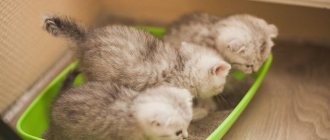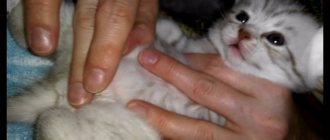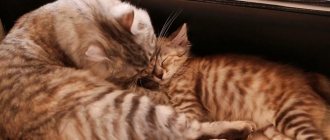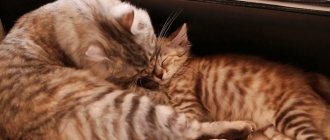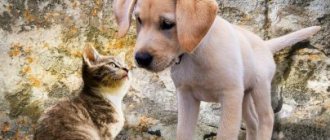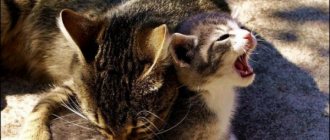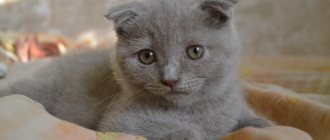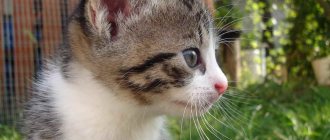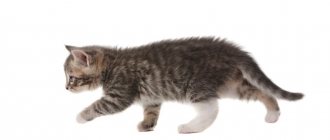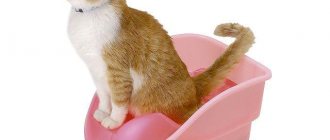Veterinarians and owners often encounter gastrointestinal disorders in kittens.
This can be due to many reasons: from a sudden change in food to life-threatening infections. Therefore, you should not turn a blind eye to changes in the animal’s well-being and expect that it will go away on its own.
Diarrhea or diarrhea is not an independent disease, but indicates the presence of a disease. With indigestion, the consistency of stool and the frequency of bowel movements changes.
This problem seems frivolous to many breeders, but it should not be underestimated. This patient’s condition requires treatment and close attention from a specialist, since with each trip to the toilet the kitten’s body loses a large amount of fluid.
As a result, dehydration occurs - a life-threatening condition of the body, accompanied by an imbalance of water and electrolyte balance.
In kittens, unlike adult cats, dehydration occurs very quickly. With profuse diarrhea, death from dehydration in a small kitten can occur within a few hours. Therefore, it is so important to begin symptomatic therapy as early as possible, identify the cause of diarrhea and eliminate it.
Toilet for newborn kittens
For the first 2-3 weeks after lambing, the cat independently cares for the offspring and takes measures to help the cubs relieve their physiological needs. The animal licks the kittens; In this way, the abdomen is massaged, which helps remove gases, facilitate urination and defecation. The cat licks off all the secretions. The kitten goes to the toilet often: the daily number of times can reach 7-10.
After 3 weeks, complementary foods are introduced into the diet. If you choose it correctly, there will be no problems with digestion, the kittens will poop on their own, without outside help.
It is necessary to monitor the stool: if harmful substances do not leave the animal’s body with feces, severe poisoning is possible.
The stomach, swollen from gases and feces, becomes painful, the kitten is worried and meows a lot. It is necessary to take action if there has been no stool for 5 days.
How often should a cat poop?
A cat is an amazing animal. If you want to have one, you need to know everything about their body.
It is very important to know how often cats poop, because this significantly affects their health and full life.
- Norms
- How to tell when your cat wants to go to the toilet
The digestive system and its coordinated and proper functioning are very important in the normal functioning of the cat’s entire body. Simply put, how a kitten will feel depends on how many times it goes to the toilet.
There are established general standards that indicate the normal state of health of a pet:
- at the age of up to three weeks, the mother helps the newborn with this; she simply licks all their secretions, so it is impossible to indicate the exact number of times. With her rough tongue, she activates the digestive system, which is not yet fully adjusted;
- A kitten at three weeks can already go to the toilet on its own, and this should be from three to six times a day. His stomach and all other parts of the digestive system are slowly starting to work;
- at the age of 2-3 months, the cat visits the litter box 3-4 times. At this age, it is recommended to transfer the kitten to a nutritious diet, monitor the consistency of feces and their color;
- six-month-old kittens are already considered adults, such a cat should walk around 2-3 times a day;
- adults – 1-2 times every 24 hours;
- Once they reach 8 years of age, all cats are considered old. Their physiological processes are not carried out to their full potential and are slowly malfunctioning. A pet can get good results if it goes to the toilet once every two days.
On average, a cat should poop once a day. This will have a positive effect on her health, feces will not stagnate in the large intestine and rectum, heaviness and bloating will not be felt, and as a result - normal functioning of the digestive system and the pet’s well-being.
The amount of feces should be up to 100 grams, but the cat should pee from 20 to 500 ml per day.
Of course, it all depends on the age of the cat, on his diet, and on his state of health. If the pet eats dry food, then cats should poop once every 2-3 days. The stool of tailed and furry pets completely depends on their diet.
If the owner thinks that his pet doesn’t go to the toilet a lot, then you can add boiled and grated beets, a little olive or vegetable oil to the diet. Sometimes, it is worth looking for feces not only in the tray, but in any place in the apartment or house.
How to tell when your cat wants to go to the toilet
Many owners, especially as soon as they accustom their kittens to the litter box, are afraid that their pet will do everything correctly and in the designated place. If a kitten scratches any surface with its paws, it shows you that it wants to poop - quickly take it to the litter box.
In order to relieve themselves, cats carefully choose a place, while sniffing everything around. If you notice this behavior in your pet, go to the toilet immediately.
Eyes that froze, thought and glazed also indicate a quick visit to the tray.
Over time, of course, the pet will get used to it and understand where it needs to go and where to relieve itself, but initially it needs to be shown to it several times.
In order for your cat to go to the toilet normally, you must do the following:
- provide him with the correct diet. The cat should eat: vegetables, fish, meat, cereals, dairy products, food with sufficient fiber content;
- if you feed your pet with special food, it must be of high quality;
- drinking plenty of water;
- the tray is always clean - the cat does not go to the toilet a second time in dirty sand;
- protect your cat from constipation and always monitor his health.
Toilet for one-month-old kittens
By 1 month, the intestines are fully developed, the animal relieves itself independently. Month-old kittens poop less often. The nature of the discharge also changes: it gradually becomes harder. The absence of stool should alert you. Signs of pathology may include refusal to eat, lethargy, apathy, anxiety, and abdominal pain.
By 3-4 months, cats switch completely to solid food. In this case, the feces become dense and take on a permanent shape. The number of urinations and bowel movements per day should be from 3 to 6 times. If the diet is dominated by fiber-rich foods, the amount of protein is not too high, bowel movements become more frequent, since food better stimulates intestinal motility.
By 5 months, the kitten should poop once daily.
How to determine the cause of diarrhea
To understand the problem why the kitten is diarrhea, you need to carefully analyze: color, texture, accompanying smell, consistency, presence of additional contents (blood, mucus).
For diarrhea that has persisted and lasted for more than one day, the help of a doctor is needed to help your pet.
Liquid yellow stool indicates poisoning of the pet, stool mixed with blood indicates worms or the presence of a foreign object that has affected the intestinal mucosa. Brown stool directly indicates an allergy, and feces with a persistent odor and a green tint indicate chemical poisoning.
Why does a kitten have problems with stool?
Newborn animals have difficulty defecating if the cat does not care for them properly. Problems can also arise in cases where kittens are cared for by humans, if the owner does not follow the rules. After feeding, it is necessary to massage the belly and groin area; To do this, it is recommended to use cotton swabs with soft bristles.
Older kittens fed solid food may suffer from digestive problems for several reasons.
Severe stress can cause constipation.
If the kitten has recently been separated from its mother, moved to a new place of residence, a visit to the veterinarian, or aggression from another animal can cause severe nervous tension, due to which bowel movements will temporarily disappear. Most often, the duration of absence of stool in such a situation does not exceed 2-3 days.
Early weaning from the cat is possible.
In such a situation, the cub greatly misses its mother and lacks her company. There may be no stool for up to 4-5 days, after which the small cat must poop. The situation is considered normal. You should be wary if bowel movements do not begin even after.
Errors in diet planning.
A sudden change in diet or excessive amounts of protein foods often leads to constipation.
Constipation occurs in animals infected with helminths.
Due to parasites, the functioning of the gastrointestinal tract is disrupted, which leads to intestinal blockage and deterioration of peristalsis. At the same time, the animal constantly scratches its butt on the carpet or other rough surface and may become too restless.
What to do for prevention?
If the baby has not yet gotten comfortable with the new owners, then their task is to accustom him to the new toilet. As soon as the kitten appears in the house, you must immediately introduce him to his personal toilet and show him where the litter box is located.
Sometimes in a new place an animal does not know where to relieve itself, and its upbringing does not allow it to go anywhere. In this case, the baby suffers, which is why constipation appears. Another important point is the selection of proper, balanced nutrition. It is better to create a diet or select a suitable brand of ready-made food together with a veterinarian. It is forbidden to suddenly switch to a new type of food, and if the cat eats natural food, it is important to ensure that prohibited foods do not fall into his bowl - fried, spicy, salty, fatty, sweets. In addition, you should periodically give your pet anthelmintic drugs and promptly treat the animal for fleas, lice and ticks.
If there are characteristic symptoms of digestive disorders, do not self-medicate, but take your four-legged friend to an appointment with a veterinarian.
How to deal with the problem of constipation in a kitten at home?
First you need to determine the cause of the problem.
Diet changes may be required. It is recommended to consult with the breeder to find out what food is best for your chosen breed.
A light massage in the abdominal area is recommended. The kitten's abdomen should be massaged with light circular movements. You cannot press or use force: this can seriously harm the cub.
If the diet is unbalanced and there are no contraindications, the use of an enema is allowed.
Medicines may be required. You should not select them yourself; it is better to consult a veterinarian. The use of laxatives is effective.
You can add a small amount of sunflower oil to your kitten's food. Vegetable fats will act as a laxative on the cat’s body.
If all measures have been tried, but the number of times a day your kittens defecate is not normal, treatment at a veterinary clinic may be required. Sometimes surgical intervention is necessary. Possible blockage caused by foreign body entering the intestines, severe pathologies of the digestive system.
List of medications for treating diarrhea
We have prepared for you a rating of the most popular medications and tablets for diarrhea in kittens.
This human drug has taken its rightful place in the first aid kits of cat lovers, since in some cases it is truly an indispensable first aid remedy for a pet. Enterosgel for kittens will help cleanse the baby's body of toxins. Kittens can be given it when:
- any diarrhea;
- chronic, acute intoxication;
- intestinal infection;
- poisoning.
Enterosgel for kittens is an excellent opportunity to help your baby from the very beginning of the disease.
All antibacterial drugs are divided into classes. This includes both drugs that inhibit the development of bacteria and bactericidal antibiotics for kittens. The most popular medicines include:
- lincosamides;
- glycopeptides;
- aminoglycosides;
- chloramphenicol, etc.
Looking from the outside at the mass of these obscure names, it is easy to understand that only a qualified veterinarian can understand this.
The only contraindication for use is age - up to a month, as well as individual intolerance to any active components of Enterofuril, which can provoke an allergic reaction to use.
In other cases, this powerful antimicrobial drug will help deal with diarrhea in a kitten in a fairly short time. Moreover, for babies it is better to buy a suspension, since it has a more moderate effect on the weak body of a small kitten.
Preventing constipation in kittens
You need to avoid excess protein, select high-quality dry food, or prepare your own food so that it is balanced. The first weeks after the move, you should give the same food that the cat is accustomed to from the breeder. Babies fed on natural food should not be suddenly switched to dry food. Cats go to the toilet more often if they have enough fiber in their diet. The animal should always have access to clean water.
Active games with your pet will be beneficial. You don't want your cat to become too passive. To interest your pet, you should buy different toys.
Small objects should not reach the cat. If there is a child at home who scatters small beads and toys, you should clean up what is scattered after him. Objects can become lodged in the intestines, causing partial or complete blockages that sometimes result in the death of the pet.
It is recommended to regularly show the animal to a veterinarian. Examinations will help detect pathologies in the early stages and take timely measures.
All information posted on the site is provided in accordance with the User Agreement and is not a direct instruction to action. We strongly recommend that before using any product, you must obtain a face-to-face consultation at an accredited veterinary clinic.
What treatment is prescribed?
To stabilize the situation, it is recommended to adjust the animal’s diet by including steamed food in its diet.
If stool that is too liquid or too hard is a consequence of poor nutrition, the first thing you should do is review your pet’s diet. When feeding natural food, it is recommended to diversify the menu with steamed vegetables and fruits, to teach the cat to eat special cat grass, which not only normalizes digestion, but also saturates the body with vitamins and essential elements. If your pet is accustomed to dry food, it is important to ensure that clean and fresh water is freely available.
For constipation, medications with a laxative effect are prescribed, for example:
